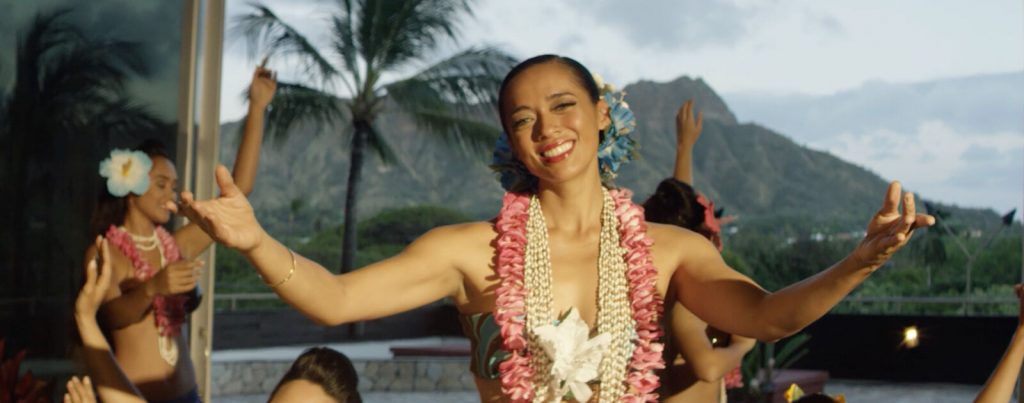Waikiki navigates the bitter seas of Hawaii’s not so idyllic life, dealing with a few too many (personal) demons to truly deliver its message in a bottle.
Waikiki’s journey started in 2014, when a screenplay called Karaoke Kings was accepted and reworked through the Sundance Institute Native Lab and Feature Film Program Screenwriters Intensive. The screenplay centred on the growing homeless community in Honolulu’s Chinatown and how they are always hoping to find love and redemption. These two themes certainly resurface in the micro-budget production made by Hawaiians, for Hawaiians. It is the first ever film produced, directed and written by a Native Hawaiian (Christopher Kahunahana), as well as starring a majority native Hawaiian cast. A Kickstarter followed suit in early 2018 and, with lots of aloha from friends and followers, an indie feature film from Hawaii is now ready to make its debut on the international film scene, set to have its virtual world premiere this week at Urbanworld Film Festival and its virtual West Coast premiere at the Los Angeles Asian Pacific Film Festival on October 29 and 30. So, let’s dig in, shall we?
Christopher Kahunahana’s Waikiki promises to show the harsh realities of many Hawaiians on the supposedly idyllic island of Hawaii. Our protagonist, Kea (Danielle Zalopaney, Hawaii Five-O), hits a homeless man with her beaten up van / temporary home while escaping her abusive ex (or not ex?) boyfriend Branden (Jason Quinn, Inhumans). Feeling morally obligated to take him in, Kea spends the next forty-eight hours juggling him, her van, and her jobs: part-time Hawaiian teacher, hulu dancer and nightclub hostess. A painful tugging on your heartstrings is intensified through scenes of brutal violence which is supposedly love, her desperate attempts to secure housing only to be shot down time and time again, and, on top of that, her new seemingly mute roommate is bringing all sorts of hurt and trauma back to the foreground in her mind. Waikiki is 77 minutes of distress and confusion, and often not just experienced on screen.
In Waikiki, Kahunahana literally shows what happens when the smiling hulu-dancer of the postcard leaves the brightly coloured environment of touristy Honolulu and struggles to survive in a world increasingly native-unfriendly. Though Waikiki acts as a surrealistic allegory for the contemporary issues of Hawaii natives, it is not exactly clear how human connection and reconnection to ‘aina (nature) manifests itself. The film is interspersed with aerial shots of Hawaii’s beautiful nature, as well featuring traditional native song that give the film a slightly psychedelic effect, especially nearing the second part of the film, when the video editing blurs what is real and what is surreal. The representation of societal issues, such as homelessness, poverty, gentrification and high cost of living and personal issues, such as PTSD, domestic abuse and mental health issues, ultimately results in blurred and muddy scenes, to the point where it is unclear what the film is trying to explore and represent.

It is the cinematography of Waikiki (Ryan Miyamoto, Twinsters), think David Lynch’s Mulholland Drive meets David Fincher’s Gone Girl, and the sound design (Ben Wilkins, Whiplash, La La Land) and music composition (Woody Pak, Seoul Searching, Planet B-boy) that keep the narrative from crumbling at the ends. Starting in medias res, Waikiki gives us a foreboding sense of continuation and perpetuation. Many storylines are introduced, with virtually none of them reaching a satisfactory conclusion. This works to a certain extent until the narrative plot is so filled with holes that there is no logic that can eventually hold it together. This becomes problematic in the second part of the film, when the gaps in the narrative leave you utterly confused to what it is that you are seeing.
In this sense, Waikiki does exactly what it has promised: it portrays human life as it is, providing no answers, and no ending. No backstory or character presentation: we are the slightly uncomfortable viewers of someone slipping down a deep dark mental hole. Yet, the big revelation of the film falls flat when you are not entirely sure what it is Kea worked through. Instead of there being one possible plot twist, it seems there are many possibilities as to what that plot twist might be exactly. In trying to figure out what is happening in that scene, you get so entangled in a web of possible storylines that the topics presented fade into the, probably not intended, background. Out of all the emotions I felt and all the topics I have seen pass by only one, sadly, one stands out: confusion.
Waikiki will be released on October 27, 2023 at Regal Union Square (NYC) and Laemmle NoHo (LA).

